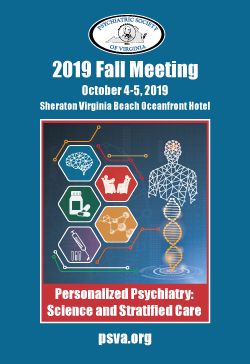Spring 2019 Issue |
|
Members in the News
Dr. Eloise Haun: A Pioneering Woman in Medicine Looks Back at a Life
of Service
BY Howard Brown
REPRINTED WITH PERMISSION FROM THE MOUNTAIN COURIER, SHENANDOAH COUNTY, VA
A smile flashes across Dr. Eloise Haun’s face as she remembers her early days in Woodstock as a 13-year-old girl racing across farm fields just to see what was there. It was the early 1950s and while the times were different, the land was much the same as today — farmland, forest, and river bottom.
“I’d go everywhere I could just exploring. I went to the fire tower, Little Powell’s Fort, walked across the dam and went into caves to see what was there. Oh, how I loved this place,” she said beaming. “And I still know where the lady slippers grow.”
Known as Ellie to friends and acquaintances, she and her family came to Woodstock from Philadelphia when her father, Harvie Clymer, became superintendent of the then-new Shenandoah County Memorial Hospital.
“With my father’s position, I grew up surrounded by the medical profession,” she said. “There were doctors in and out of the house meeting with my father and I was so fascinated with it all. I knew then I wanted to become a doctor.” She remembered one of the doctors at her father’s hospital dropping medical journal articles in her room almost before she could read.
The Making of a Physician
Haun’s education started in Pennsylvania Quaker schools. She attended public school in Woodstock, then returned to Pennsylvania to attend George School, a respected Quaker boarding school where she completed her high school education. From there she was admitted to Bryn Mawr College, where she graduated with a chemistry degree in 1958, chemistry considered a good foundation for medical school. Although today there are more women than men in medical school, that was certainly not the case in 1958.
“I interviewed with the doctor at the University of Virginia for placement in their medical school and it was immediately apparent she did not like it that I had come there,” Haun remembers. The interview continued until the she finally asked if she’d come there to find a doctor for a husband.
At that point Haun stood to leave, but before departing, asked the doctor, “Why should I want to come here if you can’t see I want to become a doctor, not marry one.” This unpleasant interview was followed by one with the head of surgery at the Medical College of Virginia in Richmond, which she said was magical in comparison. Admitted to the school, she was one of only three women in a class of 99 students.
That magical interview aside, there were unique hurdles ahead for Haun as she worked toward her medical degree. One example involved female medical students and the perceived impropriety of being allowed to examine male patients while studying urology. Haun questioned this approach, asking how she was to treat men who came to her with problems if she wasn’t allowed to study male urology.
It’s a long road of study to become a doctor and one of the requirements is an internship. Ellie spent the beginning of her internship as an emergency room doctor in Augusta, Georgia, then transferred to pediatrics at a black hospital in Columbia, South Carolina. After that internship, she went to Houston to complete six hours of certification boards. Although she could then work anywhere she wanted, she was drawn to her experiences back at the hospital in Columbia.
“In Columbia, I saw things that were not in the literature we’d studied. Patients had diphtheria, polio, all sorts of parasites, horrible infections and the most unimaginable trauma,” she said, shaking her head at the memories. Yet with this very needy population, Haun found her niche. “I was in heaven because the work with these children and adolescents was so rewarding.”
Getting a Foothold With Head Start
Having passed the boards, Haun
learned of a position as a doctor with the brand-new Head Start program. Designed to help meet the emotional, social, health, nutritional and psychological needs of preschool aged children from low-income families, Head Start got its start during the Johnson Administration in 1965 as part of the War on Poverty.
Three rural South Carolina counties banded together in 1965 to begin their Head Start programs and Haun was hired to oversee the program’s health requirements. “This was an immense effort for the communities in these counties to help these children,” she said. Children had to be immunized against a host of infections from polio to whooping cough to diphtheria and more, but immunization was just the tip of the iceberg meeting their health needs. Fundamental hygiene was a start.
“We found most of the children were not getting regular baths, and infections can be brought on by not bathing, so we saw that each child received a bath every day and we washed their clothes. By doing this, we cleaned up the ringworm that was rampant among them,” she said. Another problem: finding a local dentist in that area of South Carolina who would serve the black children enrolled in Head Start. “We eventually found a dentist who would see them at night so his other patients wouldn’t know,” she said.
Haun’s treatment of the Head Start children didn’t go unnoticed. “Because I was helping this black population, the Medical Society of South Carolina began to think I might be a communist,” she said. Her career was in danger at the time – the society could have prevented her from practicing medicine if she was a communist. The League of Women Voters came to her aid, visited the daycare center to investigate and told the Medical Society she was definitely not a communist, just a doctor doing good deeds.
A Shift to Psychiatry
In 1975, while serving at St. Mary’s Hospital in Richmond, she received a grant to study psychiatry.
“Medical science was improving enormously. There were vaccines for polio, there had been so much progress in neonatal care, but I saw there was a real need in the mental health field, so I decided that’s where I needed to be,” she said. This entailed another intense period of study along with residency requirements that gave her experience with populations from the courts to hospitals and beyond.
After passing her psychiatric exams and becoming certified, Haun went on to be active in the field she’s known for, both in Virginia and the nation. She worked with traumatized adults and children, helping them rechannel their negative experiences. Along the way, she became more active in child and adolescent medicine. Haun would go on to become president of the Psychiatric Society of Virginia and president of the district branch of the American Academy of Child Psychiatry. In 1975 she was named assistant professor of psychiatry at the Medical College of Virginia, the school where she was a new medical student in 1958.
During all this education and work, Ellie married not long after finishing her internship and had three sons, but the couple divorced in 1971.
Small-town Doc
“I was quite active in the local and national organization and had so much going on in Richmond, but I reached a point where I wanted to make a change and have a small practice,” she recalls. With fond memories of the time she’d spent in Woodstock, she found that George R. Waterman, a general practitioner and British native was retiring. Ellie took over his Woodstock practice in 1980.
Dr. Waterman was very much the old style doctor. “He still made house calls since he knew by heart every unnamed road in the county,” she said. Dr. Waterman’s record system was in drawers of 3x5 index cards covered with tiny notations. Haun made some immediate changes in the practice, ending the house calls, updating the records, and monitoring prescriptions. Although initially a general practice, her concentration gradually shifted exclusively to psychiatry.
In the early 1980s she helped administer Shenandoah County Memorial Hospital’s inpatient psychiatric unit. The unit allowed patients to be kept locally; commitment hearings could be held in-house.
“The unit had successes but there were normal difficulties,” she said. No visitors were allowed in the unit to be sure the patients were being maintained in a stable environment, but Haun found that rule was sometimes difficult to enforce in neighborly Woodstock.
“We also had to be very careful with the mix of patients in the unit and if someone became psychotic, no matter what the hour, we had to help them through it.” The psychiatric unit eventually closed when Valley Health bought the hospital.
A Vocation Serving Children
Children were always a major concern
to Ellie, dating from internship experiences in Columbia and time with Head Start. Her concerns for them continue today as new challenges present themselves. For a variety of reasons, handicapped children were often institutionalized, but the 1975 passage of Public Law 94-142, the Education for All Handicapped Children Act, brought changes. The law required children with disabilities up to age 22 to have access to public education.
“These were stormy years for no one was ready for this” influx of children into the general population, she said, noting it was particularly difficult for children with any obvious problems.“These kids were bullied in schools then, and there is still big-time bullying today because they are different. Gay kids were always subject to bullying and now we have transgender kids suffering the same.”
“When I saw these kids in my practice, they were often suicidal” because of pressure placed on them, she said. “The public really has no idea of who is in school and the level of expertise that’s needed to educate and take care of them.”
She pointed out that, although people think Shenandoah’s rural nature makes the needs of its schools different from urban areas, the same children attend classes here as they do in other places. What’s more, vulnerable immigrant populations are more apparent. “Churches do a lot of the heavy lifting helping kids in Shenandoah County and we’re fortunate they are willing to do this, but the community really needs to do more,” she said.
Haun’s Mission Moving Forward
“I have given up my practice and burned all
my patient records, but I still have a mission. Today my role is to be an advocate for the children and I’ll always be that advocate for they surely need it.” Ellie has two grandchildren in Shenandoah County schools; since coming back to Shenandoah County, she has served on the Edinburg Town Council and assisted at the Free Clinic.
And while Ellie speaks up regularly for children’s and other’s rights, she still remembers where the lady slippers grow in the countryside around Woodstock. Ask her next time you see her.
YOUR NEWSLETTER IS NOW AVAILABLE ON YOUR SMARTPHONE AND TABLET!
JOIN PSV TODAY!
PLAN NOW!
PSV 2019
FALL MEETING
October 4-5, 2019
Sheraton Virginia Beach
Oceanfront Hotel
APA Find a Psychiatrist
Are you accepting new patients?
Opt into APA’s “Find A Psychiatrist” database. To view the functionality or opt-in,
CLICK HERE
FYI: A link for this option has been added to the PSV website. Select the “About” button and then “Find a Psychiatrist” from the drop down.





